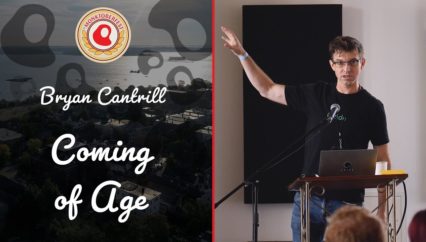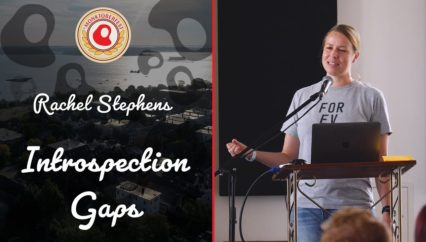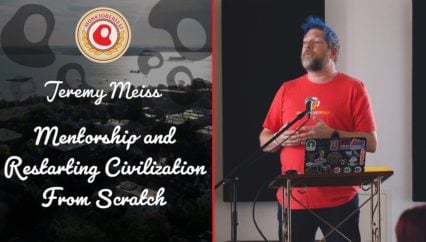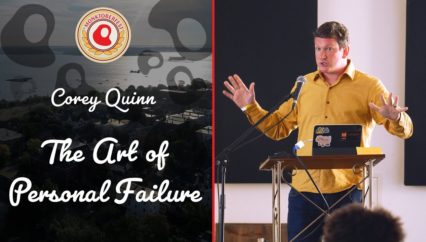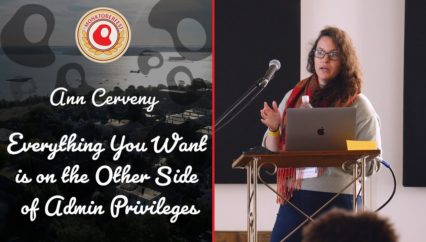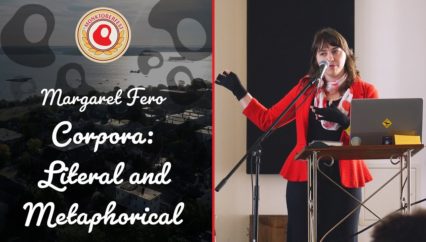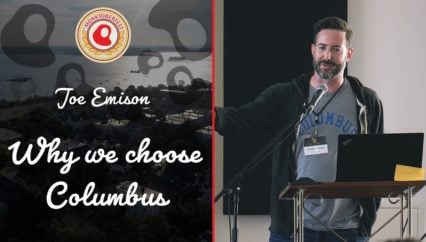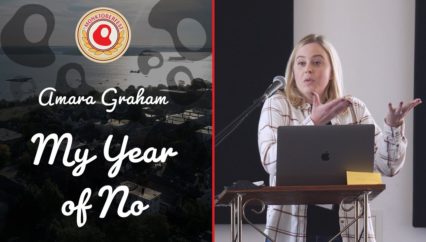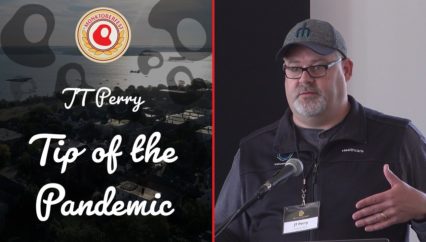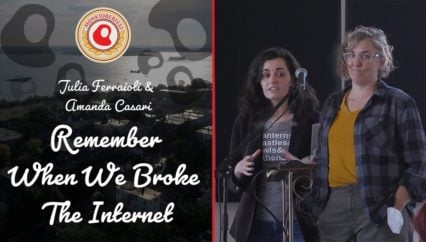We all *thought* this talk was going to be on Acid Rock Drainage, but Andrew Todd fooled us to talk about his true passions. What do you get when you combine fly fishing, trail running and craft beer? For one ecotoxicologist, the answer is the Flyathlon. In this talk, we learn about the origins of this unique event which has contributed a a half a million dollars back to local conservation projects, and are reminded that everyone in tech has a mixture of skills and passions – outside of their daily work – that might be combined to improve the world around them.
Transcript
First of all, I want to apologize if I’m a little low-energy today. I was overserved on a boat last night.
[laughter]
I was not informed that there would be alcohol at this conference, so you’ll be hearing from my lawyers.
[laughter]
I like to think that RedMonk selected my talk for its title, as well. Today I’m going to be talking to you about acid rock drainage and the direct and indirect toxicity within the Bonita Peak mining district. My name is Andrew Todd, I’m an ecotoxicologist with the US American toxicology industry.
I also have a degree in mixology from the Bartending College of America.
[applause]
And I’ll have you know, that’s the only degree that’s up on my wall at the EPA.
Professionally I’ve been the EPA’s Water Quality Chief for a six-state region which includes Colorado and the Dakotas, prior to that I was an ecotoxicologist for the EPA SRE RCLA super fund, which is really fun, which I’m going to be talk being about today.
I was appointed by the Governor. Before that, I was a contaminants biologist for the US Fish and Wildlife Service at Rocky Flats, where they make plutonium triggers, as well as the arsenal where they made various chemical weapons.
Just to prove I’m a legit scientist
[laughter]
This is a list of recent relevant scientific publications. We can talk at lunch about any of these.
[laughter]
So a quick introduction on what acid rock drainage is, it’s what happens when rocks containing sulfidic minerals are exposed to as water and oxygen. Create acidic conditions that mobilize metals from neighboring rocks and I was glad to see in an earlier talk ecosystems, we’re going to talk about ecosystems today, but real ecosystems. The ecological impacts from this acid rock drainage can result from increased metal concentrations, a decreased pH and metal oxide deposition which is what you’re seeing in that photo there. The stream on the left is iron oxide coming in. That’s a clean stream on the right and where they come together, it’s precipitating out aluminum which is the white and is also referred to as white death.
Wait. What’s going on here?
So in the immortal words of Tyler D, you are not your job, and I’m not really talking about science today. I’m here for a different reason. So you can breathe easy now, because that was going to be a real boring talk. I’ve given it before. You don’t want it. So why am I actually here?
As I mentioned, I went to Williams College, someone else we know went to Williams College. That’s a young Steve O’Grady, and while we’re smiling in this picture, our start was not as smiley as this. I went to a party where Steve was curled around a handle of tequila and I’m glad we got around F-bombs, he said if you’re not gonna pay, get the fuck out. But we went out to become the world’s best beer pong battle.
We stayed friends after college. This is at my parents’ place in Grand Lake. I’m not sure, can you tell what kind of beer you’re drinking there, Steve? I think it’s a Bud Lite, maybe, this is on a beach in the Cayman Islands, I believe. This is at my wedding. Steve is a handsome guy, isn’t he?
And this is at Steve’s wedding, a couple years later.
And this is a more recent photo of how we’ve weathered together.
The one good thing I’ve gotten from Steve is a love of Pearl Jam and so this is from 2018 in Missoula, right? My family and I drove up to meet Steve. You were at some sort of tech conference that had a Pearl Jam concert thrown on.
So in trying to figure out what I was going to talk about when Steve invited me, I went to the MonktoberFest frequently asked questions site to figure out A, what is Monktoberfest and B, what should I talk about? And I came across this … is this another damned social media conference? Negative: The Monktoberfest exists to examine the intersection of social trends and technology, blah, blah, blah. So what I did was realize that if I replaced a few words in that blurb from the FAQ section, it was relevant for me. So is this another damned trail race? Negative.
Running rivers and the flyathlon.
What we want to do in simple terms is to get outdoor enthusiasts to take a step back, to look at the natural world around them and assume an active role in its protection.
So why did I start this nonprofit? As you might imagine, in seeing the list of publications, being a career federal bureaucrat has its benefits but also its significant frustrations and limitations and it turns out, I have interests and passions beyond my career. And three of them are depicted here. I’m a trail runner, I’m a fly fisherman, and I like craft beer, not Bud Light, Steve
And I noticed that in Colorado and around the West, you have this outdoor industry that’s making billions of dollars, and this is a quote from Luis Benitez, he says the outdoor industry is worth billions of dollars and I think we can and should take care of our own backyards. And as an outdoor enthusiast myself, I feel the same. If we want these places to remain, we need to step up and advocate for their protection.
So I created Running Rivers and you can see this is my license plate so I’m all in. What is our mission? Our mission is to conserve and restore native fish populations and fresh water ecosystems by inspiring people to engage in conservation through recreation, education and on the ground projects.
Our approach is our slogan, which is conservation through recreation, and this is the start of one of our flyathlon races, you can see and I’ll describe it in more detail but they’re running with fly rods in their backpack.
So what is a flyathlon? Making fun of the triathlon. Our motto is run, fish, beer, instead of swim, bike, run.
We sacrifice a shitty domestic beer or two. It started me with a 357 and I missed and now my daughters shoot it with bb rifles, so much safer, but still effective. I think that’s a Bud Light Chelada that got shot there.
So what are the rules? You have to complete the course which depends on the water body. If it’s a lake that’s five miles up, it’s a ten-mile course. You’re not going to see any 13.1 stickers on my car. You have to complete the course and at some point you have to stop and catch a fish and both of the races in Colorado and the one race we have in Iowa, the whole trail is near the river the whole time. So you have to break off at some point, stop and catch a fish, and then your time is adjusted by the size and species of the fish. And there are lots of prizes if you win, you can win by being the fastest male, the fastest female, biggest fish, there’s all sorts of ways to win, but we use this as a fundraiser, so it’s a lot of fun to get out in the woods with your friends and party. But we really want to use this to be part of the solution in the preservation of these places that we love. So we raise funds for that, we do that as an incentivized crowdfunding model. With their peers and family, and then they can win prizes if they raise the most money or in drawings, and that sort of thing. So that’s our fundraising model.
But the other big piece is about building community. We try to be inclusive of all abilities. We’ve got new trail runners, we’ve got new fly-fishermen that show up every year, and those two things, as well as craft beer, as you all know, can be a little douchey in the wrong environments, so what we’re trying do is make them accessible so people aren’t intimidated to learn to fly-fish or to start trail running for the first time. And then I would say the best element of these events is we hold them in remote offline festival atmospheres, so it’s really intended to get people off their devices, get people out in the woods around a campfire and you’d be surprised the conversations that result and the relationships that develop.
This is one of the first middle flyathlon, 60 is the cap. We’ve held this races for this is the 8th summer. We’ve held one in the Lake Fork which is in southwestern Colorado, we have a race in Iowa, I didn’t know there were trout in Iowa, but it turns out there there are, and we’ve held that race for five years. We held kids flyathlons — Covid is not gone. My dad is an infectious disease specialist, it’s not gone, but we had a social distanced event in 2020 that also raised money. And then we had interest in all these other places for developing new events. But as I mentioned, this is extracurricular, so I need help in putting on these races if anyone is interested. So who on Earth would be interested in such an event? Turns out our demographic is pretty broad. We’ve had people participate as young as 13 and as old as 75, this is a collage of people that participated that one year
As I mentioned, we have people who are new to trail running, new to fly-fishing and so it’s kind of all over the map who shows up for these kinds of things.
In terms of sponsorship, we’ve got a wide range of distilleries, breweries, outdoor gear manufacturers, all over the map. National Geographic was a sponsor this year, which was kind of cool. We gave out maps of the area that we were holding the event in and they’re real interested in working with us moving forward.
In terms of some of the press that we’ve received, we’ve been in Outside magazine, we’ve been on Patagonia’s website. A great podcast called the Dirt Bag Diaries. If you haven’t listened, it’s a great listen. If you do something extremely novel and kinda dumb, people want to write about it, so we’ve been in all these publications and we were called Colorado’s coolest new triathlon, which I thought was kind of cool.
Outside of these interests, we have to feed the beast, we’ve done particularly this year some nonevent engagement strategies. We have what’s called the Troutman in associated longer distances, something called the Ultrout with a couple of umlauts, because who doesn’t like umlauts? Something called the Lucifish, as you can imagine, there aren’t a lot of people who’ve finished Ultrout or Lucifish.
I’ve got one guy who’s crazy and I’ve made all these additional ones because he’s crazy.
[laughter]
And you’ve got to feed the beast. Fish slapping is when as you see at the bottom photo there it’s when you run someone else’s race and you stop at some point and catch fish during their race and take a picture of said race on their race bib,
And then the final one is we call the fastest known fish, there’s a trend in the ultra running community that it’s the fastest known time where you record how quickly it takes you to get to the top of the mountain and back and theres’ a website that has all that documented and we thought it would be more fun if we added fishing and beer to it, so we created fastest known fish which is essentially fastest known time plus fish and beer.
Another program we created we call the rare fish rare beer project. We’re working with distilleries to make beers and whiskey, we made a whiskey that raises awareness and money for that are within the watershed of the brewery or distillery. Volume one was Trucha Grande.
>> The Greenback is a Colorado State fish, and this is the Greenback Distillery. Because that’s what they’re native to. We made a Nativa whiskey and that raised about $10,000 for projects. We made a beer in Iowa, called Fontinalis, which is the scientific name for brook trout. We made Colorado Cuttie raised money for the Colorado cutthroat trout.
At the end of the day, we’re really committed — the whole point of this is to advance conservation. 80% or greater, we’re all volunteer at this point, so that 20% has gone to pay for insurance, among other things, but we’re putting 80% back into on-the-ground projects. In terms of the type of work we’re funding, our impact over the last 8 years we’ve raised over half a million-dollars now for projects and this money is the perfect cash match for grants. So if a state agency is looking for a grant, they oftentimes go for federal money and we can leverage our money that we’ve raised in a significant manner.
So these are some of the recent projects. We partnered with for a major renovation in the northern drainage of the Sand Dunes. That’s through Phase 1 and when we’re done that will be the largest strong hold of Rio Grande cutthroat trout in Colorado, and a couple of projects here if anyone is interested at lunch I’m happy to talk to you about them. The bottom one is a project in Iowa that we’ve funded with the funds raised during that race.
What’s our vision for the future? Our goal is to expand these existing programs into new regions, establish new programs to increase our impact, and then develop our internal capacity to do more. As I mentioned, I work for the EPA. All this takes a lot of time, and I also have a family that, you know, suffers to some degree when I work on this instead of hanging out with them. So I’m looking in the coming years to try to hire an Executive Director to do all that work instead of me doing it, in addition to my job.
So why am I talking about this? Is it again, back to Tyler Dirdan, you’re not your job, I mean your job is an important part of who you are, but there’s all sorts of ways to make an impact outside of what you do professionally. A lot of hours in the week. Work shouldn’t take up all of them. World needs creative ideas that are fun right now, and if a race-pairing, trail running fly-fishing and craft beer can make this kind of an impact so can whatever idea you guys have, and Steve asked me to push y’all to do something spectacular, so that’s it in a nutshell. And I really like fishing, and I — as a —
[applause]
As a former employee of Trout Unlimited you haven’t always got to end with gratuitous fish porn, so here you are.
[applause]
